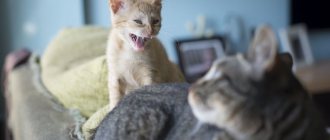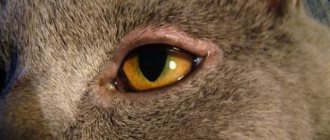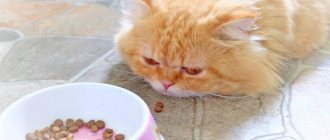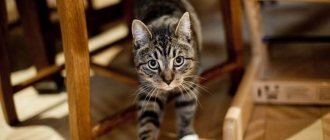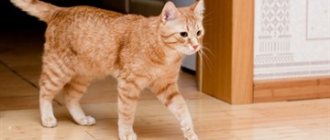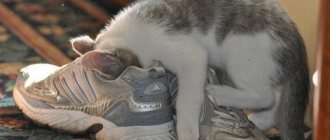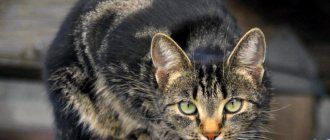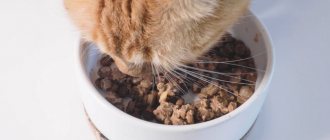Very often, cats are attributed to the human type of thinking. But they are predators that were tamed and domesticated by humans more than 10 thousand years ago. Since then, many of their habits and needs have changed: cats do not eat raw meat, and their aggressive behavior is now more like freedom-loving behavior. But the only thing that has survived to this day is the hunting instinct. In this article, we invite you to consider the reasons why pets bring mice to their owners, as well as how to properly respond to this and ways to solve this problem.
Why do cats bring caught mice to their owners?
Animal rights activist, coordinator of the Novokuznetsk Society for the Protection of Homeless Animals “Cat and Dog” Vadim Raskin:
“Cats are often attributed a human type of thinking. But a cat is an animal, a predator, once tamed and domesticated by man. This is what we must proceed from.
There is a common misconception that cats do not live in packs, that cats are solitary animals. This is wrong. While helping homeless animals, I have often seen cat prides with a strict organization and their own hierarchy. As for domestic cats, we call them and consider them domestic cats. The cats themselves have no idea about this; they perceive the world around them as a unique world of wild nature, and the family in which they live as a pride. Moreover, from the cat’s point of view, the owner is not always the head of the pride
Therefore, the habit of bringing caught mice home to the owners is nothing more than caring for one’s flock, laid down at the level of instinct. This is what their wild ancestors did. Cats brought mice not only as food, but as a teaching tool. Using the example of a strangled, half-dead mouse, they developed hunting skills in kittens and showed how to deftly catch and quickly kill prey.
Never scold your cat for bringing you prey. They show concern for you. There is no need to demonstratively throw away the mouse in their presence. They don't know that you don't eat mice, but they know that you're not very good at hunting mice compared to them.
However, we should not forget that field mice are carriers of a number of diseases. And if your cat lives in the country or in the village in the summer and hunts mice, carefully monitor her well-being.”
Version 2. Funny.
From a cat's point of view, you and I are typical incompetents when it comes to catching mice. But she is not averse to helping us with this as much as she can. A well-fed cat willingly shares its prey with its fellows. Cats that do not make good hunters sometimes receive strangled mice or other gifts from more successful cats. Among cats living on farms and raising kittens together, there are sometimes individuals who prefer to catch mice than to feed their offspring. The hunter brings her trophies not only to the kittens, but also to other mothers who have taken on her care. Such a cat demonstrates to the common offspring, using the example of a half-strangled mouse, how to catch and deftly kill such prey. It is for this purpose, according to researchers, that cats bring mice to their owners. For this they quite rightly expect at least praise from us. If the mouse manages to escape, we, according to the cat, should take part in the pursuit of it. In order not to offend the best feelings of the cat, we should not shout in horror: “What kind of disgusting thing did you bring!”, but, if possible, gratefully accept the generous gift and take care of the rodent without disgust. Take it somewhere, let the cat think that you are going to feast on the mouse in a quiet corner. She doesn't want her to see you throwing away her gift.
Last week the cat caught a mouse in the house for the first time. Autumn - and the mice began to creep out of the field towards the warmth. Mom says: you should have seen his eyes - half his face! That is, as I understand it, he caught the mouse, obeying ancient instincts, strangled it as expected and brought it to the owners - everything as O.K. writes. But at the same time, the cat himself was apparently immensely surprised, he was not used to catching food, food usually waits for him on its own (or they even carry His Highness to the food in their arms), and here the strangeness is this: it seems like food, if you believe the ancestors, but she came herself. In general, the only good thing is that he didn’t eat the mouse; I’m worried that rodents are being poisoned in our village.
Hunting instinct
Based on recent research, domestic cats are the most ruthless predators who love to play with their prey. Regardless of the breed, cats have a certain cruelty towards prey. There is no reason to be afraid of your pet and consider it a bloodthirsty killer if one day you see a dead bird or part of it on your bed. With this behavior, the cat does not want to scare anyone, but is waiting for praise. She demonstrates that she not only protects the territory from other animals, but also shares the food she gets with her owner.
Even those pets who are deprived of street walks are prone to hunting. The presence of an open window or balcony in the house can be a wonderful opportunity to hunt rodents, birds and bats. Unfortunately, such house hunting can end disastrously for owners living on high floors - cats often get lost or broken due to their instincts.
- Why mosquito bites itch and swell - a normal and allergic reaction to insect saliva
- Prague Rat - characteristics and description of the breed, coat type and color, keeping at home
- Pizza with mushrooms recipe with photos step by step
We reveal the true reasons why cats carry dead animals home
All cat lovers know that these graceful, furry animals are dexterous and successful hunters. Pets often bring their prey to the owner. Zoologists note several reasons why cats carry dead animals home. The owner should know not only the subtleties of animal psychology in relation to cats, but also what actions to take if hunting trophies are discovered in the house.
Read in this article
Mice in the diet - harm or benefit
Rodents are as beneficial as they are harmful to cats, at least according to veterinarians who are concerned about the “bouquet” of diseases transmitted by the former. It is believed that mice (like rats) are carriers of infectious diseases that are dangerous both for the pets themselves and for their owners.
The list of such diseases includes:
- trichinosis - difficult to treat and caused by helminths that parasitize the intestines (larvae penetrate muscle tissue and destroy it);
- ringworm ( ringworm ) is a fungal infection that affects the appearance of the coat/skin. The therapy is simple but long-lasting;
- leptospirosis - affects various organs and is accompanied by fever. A cat becomes infected through contaminated water, eating mice or coming into contact with their secretions;
- toxoplasmosis is dangerous for pregnant women and is often asymptomatic. About 50% of rodents are considered carriers of the disease;
- salmonellosis is an acute intestinal infection that threatens humans and animals;
- tularemia , pseudotuberculosis and others.
Hypothetically, a cat that eats mice could become infected with rabies, but this probability is reduced to zero if the animal is vaccinated. The second thing that should reassure the owner is that the virus is transmitted through saliva, that is, the mouse must injure the cat.
Important! Those who live in private homes and keep rat-catching cats say that their animals hunt rat mice for many years, avoiding any infectious diseases. Several generations of cats live to a ripe old age, enriching their daily diet with rodents without tragic consequences for health.
A cat is more likely to be poisoned if it tastes a mouse that has died from the poison used in deratization. If the poisoning is mild, you can get by with pharmaceutical absorbents; in case of severe poisoning (vomiting, diarrhea with blood, liver/kidney failure), call a doctor immediately. Also, when in close contact with rodents, pampered domestic cats often pick up fleas or helminths.
Return to content
Reasons for behavior
Most often, owners who let their pet outside the premises are faced with the fact that a corpse or half the carcass of a bird or mouse appears in an apartment, country house or dacha. Often, potential cat prey will wander into a city apartment and, having been caught by a furry homebody, will appear on the rug, on the floor, or even in the owner’s bed.
Having discovered a trophy that is valuable from the pet’s point of view in his home, the owner, as a rule, is interested in why cats bring their prey to their owners. There are many guesses about this phenomenon, including incorrect ones.
Some owners mistakenly believe that in this way the pet expresses gratitude for the good attitude towards him, a well-fed and calm life. Others naively believe that signs of attention in the form of the carcass of a caught mouse are a manifestation of love and care for the owner on the part of the cat. However, such explanations do not fully correspond to the motives that prompt the animal to carry a bird or rodent that was caught with difficulty into the owner’s house.
To understand this issue, you must first understand why a well-fed and satisfied pet goes hunting, what prompts the animal to chase a gray mouse with a full bowl of treats?
I bring everything I own home
Of course, the reason for the hunting passion of furry beauties is a strong natural instinct. It is he who pushes even a well-fed domestic cat to an ancient activity - hunting. Being representatives of a large cat family, the pets living with us have not lost the skills of a successful hunter over the centuries of domestication. That is why, even if the bowl is full of the most delicious meat, a domestic cat will not miss the opportunity to hunt a bird or rodent.
The reason that motivates a cat to share its prey with its owner is also based on the instincts laid down by Mother Nature. Zoological scientists put forward several explanations for this behavior of animals, based on scientific data - zoopsychology.
According to one version, the cat, being a territorial animal, is highly dependent on the environment and the room where it grew up and is constantly located. In modern conditions, for a pet, this territory is an apartment, a country house in which it lives. The reason that prompts the animal to bring its prey into the house is often precisely the territorial instinct.
The animal feels that in an alien environment (on the street, in a park, in a garden) the prey can be lost, so it tries to take its trophy to a safe territory that is familiar to it. Being well-fed, not every cat will eat a rodent. Many animals limit themselves only to the excitement of hunting and bring prey to their home.
Provides food
In the wild, many felines live in prides - large families where each member has specific responsibilities. For example, mother cats are involved in raising and training their cubs, while more mobile individuals obtain food.
You can often see a picture of a father cat carrying food in his teeth to his “other half” and babies. Therefore, another reason why a cat can “treat” the owner with a caught rodent is the perception of a person as a relative. Most pets are sure that the two-legged individual living on their territory is not able to provide food for itself on its own.
How to react to the owner
Having understood the reasons why the cat brings mice to the owner, it is necessary to develop the correct behavior in such a situation. First of all, you should not scold or show negative emotions at the sight of a killed bird or mouse, no matter how terrible this sight may look.
If a pet, which had the best intentions of feeding or teaching its owner to hunt, is scolded, punished or shown displeasure, this can cause a feeling of mistrust and alienation in the animal.
If you find a dead rodent, bird or other trophy in your home, household members should not panic. As a rule, the prey is already dead and poses no threat. If a hunting trophy shows signs of life, then measures must be taken to kill it safely.
They are trying to feed you and teach you
The cat takes its owner for some semblance of itself. She sees that for some reason her owner does not catch mice, and decides to do this work for him. They say, if he cannot hunt (perhaps due to health reasons or lack of skills), then I am ready to help.
Sometimes a cat, to the horror of the female part of the family, brings a mouse, slightly strangled, but still alive, and proudly presents it. This is a kind of training: she wants you to practice the art of catching rodents with an inactive prey.
What to watch out for
There are unpleasant aspects to the fact that an animal brings its prey into the house:
- Not all household members are calm about this kind of surprise. In rare cases, various kinds of phobias are observed, expressed in fear of dead birds, mice, etc.
- Mouse-like rodents often become targets for the use of household pesticides, which poses a serious threat to the health and life of the furry huntress.
- Any prey (mice, rats, moles, pigeons, etc.) is a potential source of helminthiasis for both cats and humans.
- In addition to infection with worms, pets that actively hunt are susceptible to diseases such as plague, piroplasmosis, encephalitis, as well as fungal and viral infections that are dangerous to health.
- Half-dead mice and rats can injure a person, and this is fraught with a number of diseases, including life-threatening rabies.
Where to put the loot
When a domestic cat catches mice and brings them home, you need to be able to accept such “gifts” correctly. The prey must be extremely carefully, observing all hygiene standards (wearing gloves), placed in a jar, bag or box and thrown away. There should be no cat nearby. She must assume that her catch, brought home, was eaten by the owner. After the procedure, gloves should be thrown away and hands should be washed with antibacterial soap.
© shutterstock
But, since an animal brought home can become a threat to the health of the cat’s owner, one should try to reduce such “supply of provisions” to a minimum.
Bringing a trophy is a way to attract attention
The pet may be severely lacking in care, affection and love. It happens that people spend a lot of time at work and do not have the opportunity to play with their cat. Therefore, she tries to attract attention to herself by regularly dragging home dead birds and mice. The only way out of this situation is to spend as much time as possible with your pet. You definitely need to play with him. Give your cat the warmth and affection that he clearly lacks. Then he will stop bringing you “unpleasant gifts.”
Potential Hazards
Is it safe for a cat to indulge in hunting? Not as much as you would like.
Rats, often the prey of cats, are carriers of diseases such as rabies and distemper; they can also be intermediate hosts of fleas and ticks, which are often carriers of piroplasmosis and encephalitis. Birds often carry subcutaneous mites and fungal infections. In addition, street animals can “give” worms to your pet. In cities, rodents are periodically poisoned with rat poison, which, when it enters the cat’s body, kills it.
Owners have phobias of rodents and birds. Phobias should not be confused with fears. The former make a person lose control of himself and cause many unpleasant emotions and problems. If the owner has such deviations, the cat that brought a “gift” into the house may be given to someone else or even thrown out into the street.
Peculiarities of animal behavior as a result of long-term coexistence with humans
0 Having become a member of the human family, cats changed not only their lifestyle, but also gradually adapted their behavior to new conditions. They gladly accept the love, care and affection of their owners: - Achieving more attention, pets try to prove themselves to be good breadwinners and keepers of home peace. They bring and demonstrate their prey to the owner. — The offer of obtained food shows the highest degree of favor and trust. No matter how shocking such signs of respect and friendship may seem, family members should not show dissatisfaction with the behavior of the breadwinner. The cat will not understand the reason for the punishment. One can only try to determine a neutral place for the delivery of the next batch of provisions, honorably moving the dead body there.
Token of gratitude
A cat may bring dead birds and mice into the house in order to express appreciation and gratitude to the owner for providing her with shelter and food. A man cares about his pet and she wants to answer him in kind. For a cat, sharing a trophy means once again emphasizing its importance to family members.
Why see a rodent in the yard or office?
Having noticed a mouse appearing in the office, signs advise paying attention to the behavior of the animal:
- Shitting on office furniture - there is an ill-wisher among colleagues who spreads false rumors to his superiors.
- Gnaws wires or documentation - to delays in salaries or large expenses that will undermine the financial situation.
- A mouse tinkering with supplies near the workplace means receiving a bonus or promotion.
- Running under the table - wealth, a big win or an inheritance awaits the owner of the office.
If a mouse is found in the yard, the interpretation of the signs may vary depending on the circumstances:
- there are a lot of mice running around on the ground - the year will be lean;
- rodents eat hay and straw - a harsh and frosty winter is coming;
- the mice built a nest in the flax - a lot of snow will fall in winter.
Interesting process
This cute, fluffy, affectionate creature is a natural enemy of field mice, house mice, and rats.
Pests cannot even stand the smell of cats; they avoid their property and fear for their lives. In cats, the huntress instinct is genetically embedded. Even when well-fed, she will not miss the moment to chase a mouse that suddenly appears. The process itself gives pleasure - to catch, not to miss. But whether to kill, eat or not depends on other factors.
Interesting!
A study was conducted in the USA. They crossed purebred cats and yard cats with one cat. The kittens were swapped after they were born. Purebred cats were raised by yard cats. As a result, it turned out that everyone had developed hunting skills. Mothers regularly brought small rodents to their kittens. But further actions were different. The yard worker killed in cold blood, showed how it should be done to the kittens, and gave them to them to eat. The thoroughbred was limited to playing. The conclusion followed was that in order for kittens to start catching mice and eating them, an example is needed. Instinct alone is not enough; skills are also required.
